新概念五种时态
新概念英语 时态大全

第八章时态8.1概说8.2 一般现在时(II_2,II_26,II_50)一般现在时可用于陈述现在时间内发生或存在的事件、动作或情况。
这些事件、动作或情况也可能会无限期地延续下去。
一般来说一般现在时可用于以下几种情况:1>一般现在时可用于现阶段内发生的情况E.g:My father works in school.My sister wears glasses.No two sorts of birds practisequite the same sort of flight.没有任何两种鸟飞行方式相同的。
2>表示习惯性的动作,通常表示不断重复的动作,时间状语可带可不带。
E.g:She gets up at 7:00. (即天天如此)John smokes a lot.当使用频度副词,如always, never, usually, rarely, sometimes或副词短语every day, every week 时,这种现在时可使习惯动作表现得更加明显。
She visits her parents every day.Cats never fail to fascinate human beings.Sometimes the secrecy goes to such an extent that the whole nature of the research cannot be mentioned.有时,保密竟达到这样的程度,即连研究工作的整个性质都不准提及。
----How often do you go to the dentist?----I go every six months.----Do you ever eat meat? (你经常吃肉吗?)----No, I never eat meat.3>一般现在时可以用来表示现在的特征或状态E.g:I am an art student and I paint a lot of pictures.(目前状态)它也经常用于表述经常性或习惯性的动作,或带有普遍性的情况,频度副词可有可无。
新概念英语第一册时态总结+练习
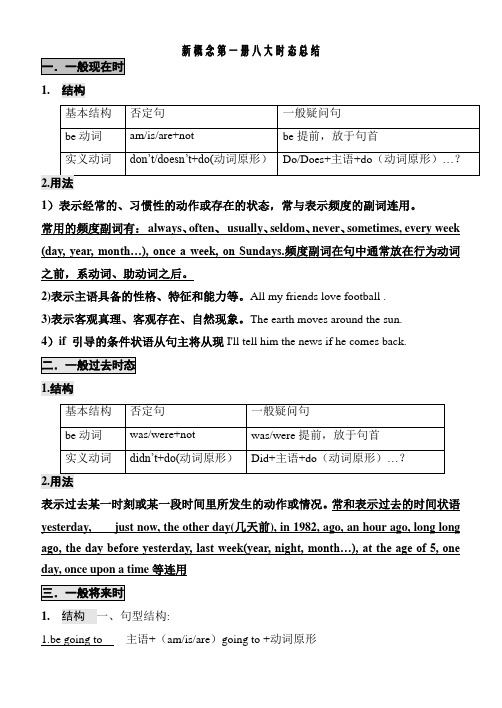
新概念第一册八大时态总结一.一般现在时1.结构基本结构否定句一般疑问句be动词am/is/are+not be提前,放于句首实义动词don’t/doesn’t+do(动词原形)Do/Does+主语+do(动词原形)…?2.用法1)表示经常的、习惯性的动作或存在的状态,常与表示频度的副词连用。
常用的频度副词有:always、often、usually、seldom、never、sometimes, every week (day, year, month…), once a week, on Sundays.频度副词在句中通常放在行为动词之前,系动词、助动词之后。
2)表示主语具备的性格、特征和能力等。
All my friends love football .3)表示客观真理、客观存在、自然现象。
The earth moves around the sun.4)if 引导的条件状语从句主将从现I'll tell him the news if he comes back.二.一般过去时态1.结构基本结构否定句一般疑问句be动词was/were+not was/were提前,放于句首实义动词didn’t+do(动词原形)Did+主语+do(动词原形)…?2.用法表示过去某一时刻或某一段时间里所发生的动作或情况。
常和表示过去的时间状语yesterday, just now, the other day(几天前), in 1982, ago, an hour ago, long long ago, the day before yesterday, last week(year, night, month…), at the age of 5, one day, once upon a time等连用三.一般将来时1.结构一、句型结构:1.be going to 主语+(am/is/are)going to +动词原形2.will :主语+will+动词原形(will为助动词,与情态动词用法相同,与动词原形构成谓语,不需要根据人称进行变化。
新概念英语第一册语法知识点
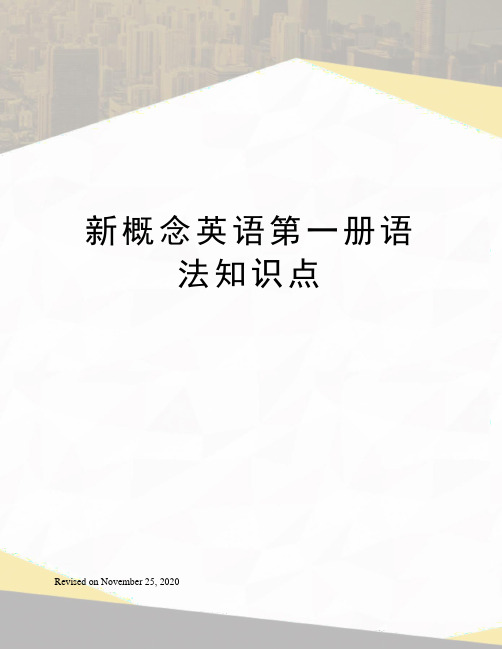
新概念英语第一册语法知识点Revised on November 25, 2020★含有be动词的句子He is a teacher.The girl is very beautiful.Tim and Jack are students.★变疑问句将be动词移到句首Is he a teacherIs the girl very beautifulAre Tim and Jack students★变否定句在be动词后面加notHe is not a teacher.The girl is not very beautiful.Tim and Jack are not students.★肯定回答及否定回答Yes, he is. No, he is not.Yes, she is. No, she is not.Yes, they are. No, they are not.★含有一般动词的句子★第三人称单数及单数名词He likes books.She likes him.The dog likes bones.★变疑问句在句首加does, 动词变为原型Does he like booksDoes she like himDoes the dog like bones★变否定句在主语及动词之间加doesn’t, 动词变为原型He doesn’t like books.She doesn’t like him.Th e dog doesn’t like bones.★肯定回答及否定回答:Yes, he does. No, he doesn’t.Yes, she does. No, she doesn’tYes, it does. No, it doesn’t.注意:第三人称单数形式一般在动词后面加S。
★其他人称及复数名词I want to have a bath.We have some meat.The students like smart teachers.★变疑问句在句首加doDo you want to have a bathDo we have any meatDo the students like smart teachers★变否定句在主语和动词之间加don’t.You don’t want to have a bath.We don’t have any meat.The students don’t like smart teachers.★肯定回答及否定回答Yes, I do. No, I don’t.Yes, we do. No, we don’tYes, they do. No, they don’t.构成:主语+be动词+动词的现在分词+其它成分We are having lunch.He is reading a book.The dog is running after a cat.The boys are swimming across the river.★变疑问句将be动词移到句首Are we having lunchIs he reading a bookIs the dog running after a catAre the boys swimming across the river★变否定句在be动词后面加notWe are not having lunch.He is not reading a book.The dog is not running after a cat.The boys are swimming across the river.★特殊疑问句:what, which, how, where, who, etc.疑问词+be动词+主语+现在分词What are you doingWhat is she doingWhat is the dog doing没有进行时的动词(必背)表示状态、思想、感情、感觉的动词不能表示正在进行的动作1. 表示感觉、感官的词see, hear, like, love, want2. have, has作为动词”拥有”的含义时,没有进行时yesterday, last night, the day before yesterday, three days ago.含有be动词的句子,将动词变为过去式,am / is的变为was,are的变为wereI was at the butcher’s.You were a student a year ago.The teacher was very beautiful ten years ago.★变疑问句将be动词移动到句首Were you at the butcher’sWere you a student a year agoWas the teacher very beautiful ten years ago★变否定句在be动词后面加notI was not at the butcher’s.You were not a student a year ago.The teacher was not very beautiful ten years ago.★肯定回答否定回答Yes, I was. No, I was not.Yes, you were. No, you were not.Yes, he/she was. No, he/she was not.★特殊疑问句:What did you do不含有be动词的句子,将动词变为过去式,动词过去式构成见附录I finished my homework yesterday.The boy went to a restaurant.The Sawyers lived at King Streeta year ago.King Streeta year ago.★变疑问句在句首加did,动词变为原型Did you finish your homework yesterdayDid the boy go to a restaurantDid the Sawyers live at King Streeta year agoKing Streeta year ago★变否定句在主语和动词之间加did not,动词变为原型I did not finish my homework yesterday.The boy did not go to a restaurant.The Sawyers did not live at King Streeta year ago.King Streeta year ago.★肯定回答及否定回答Yes, I did. No, I didn’t.Yes, he did. No, he didn’t.Yes, they did. No, they did not.have/has+过去分词用法:1)表示过去发生且和现在有某种联系的动作,常和just, usually, already,since等时间副词连用I have just had lunch. (饱了,不用再吃了)He has had a cup of tea.(不渴了,不用再喝)They have already had their holiday. (不能再度假了)The boy has already read the book. (已经知道书的内容了,不用再看了)2)询问别人是否做过某事一般用现在完成时Have you finished your homeworkHave you been to BeijingHave he seen the film3)表示开始于过去并持续到现在的动作I have lived in Beijing for twenty years.I have worked for this school for 1 year.4)表示一种经历、经验:去过…地方,做过…事情,经历过…事情I have never had a bath.I have never seen a film.I have never been to cinema.I have ever been to Paris.Have been to表示去过,have gone to 表示去了I have been to London.(人已经回来)He has gone to London.(人还在那里)5)表示一种结果,一般不和时间副词联用I have lost my pen.I have hurt myself.He has become a teacher.She has broken my heart.句型变化:★变疑问句将助动词移到句首,变否定句在助动词后面加not.Have you lost your pen I have not lost my pen.★肯定回答及否定回答Yes, I have. No, I have not.★特殊疑问句:What have you doneWhat has he done一般过去时与现在完成时的区别:凡是有明确的表示过去的时间状语的句子为过去时注意:有些动词表示的动作有一个终点,不能再延续,因此不能和表示一段时间状语连用错:I’ve left Beijing for 3 days.对:I left Beijing 3 days ago. I have been away from being for 3 days.经常和tomorrow, next year, the day after tomorrow, the year after the next, in five hours’ time, etc. 表示将来的词联用结构:主语+助动词will+动词原形I will go to America tomorrow.The pilot will fly to Japan the month after the next.Jack will move into his new house tomorrow morning.★变疑问句将助动词移到句首Will you go to America tomorrowWill the pilot fly to Japan the month after the nextWill Jack move into his new house tomorrow morning★变否定句在助动词后面加notI will not go to America tomorrow.The pilot will not fly to Japan the month after the next.Jack will not move into his new house tomorrow morning★肯定回答及否定回答Yes, I will. No, I will not.Yes, he/she will. No, he/she will not.Yes, he will. No, he will not.★特殊疑问句:What will you do结构:had+过去分词After she had finished her homework, she went shopping.They had sold the car before I asked the price.The train had left before I arrived at the station.After/before引导的时间状语从句放在句首要在句子后面加逗号,如果放在主句后则不用。
新概念英语八种时态一览表
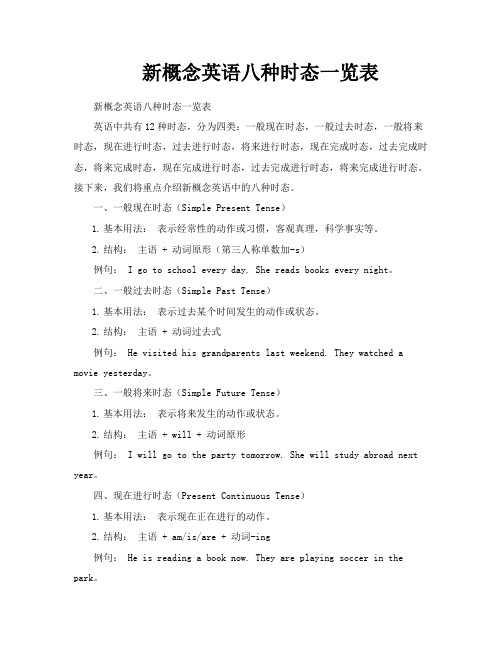
新概念英语八种时态一览表新概念英语八种时态一览表英语中共有12种时态,分为四类:一般现在时态,一般过去时态,一般将来时态,现在进行时态,过去进行时态,将来进行时态,现在完成时态,过去完成时态,将来完成时态,现在完成进行时态,过去完成进行时态,将来完成进行时态。
接下来,我们将重点介绍新概念英语中的八种时态。
一、一般现在时态(Simple Present Tense)1.基本用法:表示经常性的动作或习惯,客观真理,科学事实等。
2.结构:主语 + 动词原形(第三人称单数加-s)例句: I go to school every day. She reads books every night。
二、一般过去时态(Simple Past Tense)1.基本用法:表示过去某个时间发生的动作或状态。
2.结构:主语 + 动词过去式例句: He visited his grandparents last weekend. They watched a movie yesterday。
三、一般将来时态(Simple Future Tense)1.基本用法:表示将来发生的动作或状态。
2.结构:主语 + will + 动词原形例句: I will go to the party tomorrow. She will study abroad next year。
四、现在进行时态(Present Continuous Tense)1.基本用法:表示现在正在进行的动作。
2.结构:主语 + am/is/are + 动词-ing例句: He is reading a book now. They are playing soccer in the park。
五、过去进行时态(Past Continuous Tense)1.基本用法:表示过去某个时间正在进行的动作。
2.结构:主语 + was/were + 动词-ing例句: She was studying when I called her. They were watching TV at that time。
新概念英语:时态结构图

现在完成进行:have/has been doing
1.延续性多次过去某一刻开始到现在:
all this morning,these few days,all night,this month,recently;since,for(状短/从);
2.表重复(终止性)buy
过去
一般过去:did sth. was/were ~
(动作早于主句动作,表原因先后)
3.未实现愿望;4.no sooner~than~Hardlywhen
过去完成进行:had been doing
1.过去时间为前提;by/before+过时
2.与表“突然”意义的when从句连用:
She had been looking at the photo for a long time when she realized it was ~.
过去
将来
一般过去将来:would/should do
1.带时状的从句或间接引语(主句谓语是过去时态);
My brother told me that he would be back on Saturday.
过去将来进行:would/should be ving
1.表计划正常发展,宾从,定从,状从和间接引语;(不表意愿和打算)
He will be wat礼貌的询问和请求。
Will you be lending me~
将来完成:shall/will have done
1.by/before+未来时状从和条状从;
2.对某一业已完成的动作或事推测;
新概念第二册语法知识点汇总
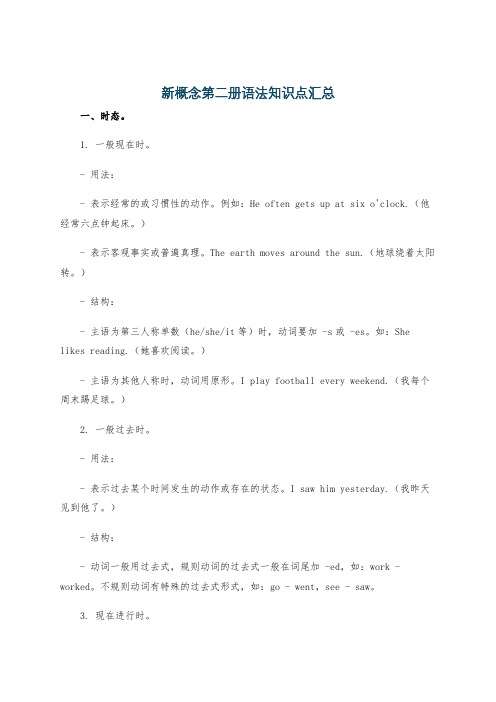
新概念第二册语法知识点汇总一、时态。
1. 一般现在时。
- 用法:- 表示经常的或习惯性的动作。
例如:He often gets up at six o'clock.(他经常六点钟起床。
)- 表示客观事实或普遍真理。
The earth moves around the sun.(地球绕着太阳转。
)- 结构:- 主语为第三人称单数(he/she/it等)时,动词要加 -s或 -es。
如:She likes reading.(她喜欢阅读。
)- 主语为其他人称时,动词用原形。
I play football every weekend.(我每个周末踢足球。
)2. 一般过去时。
- 用法:- 表示过去某个时间发生的动作或存在的状态。
I saw him yesterday.(我昨天见到他了。
)- 结构:- 动词一般用过去式,规则动词的过去式一般在词尾加 -ed,如:work - worked。
不规则动词有特殊的过去式形式,如:go - went,see - saw。
3. 现在进行时。
- 表示现在正在进行的动作。
Look! She is dancing.(看!她正在跳舞。
)- 结构:- be动词(am/is/are)+动词的 -ing形式。
He is reading a book.(他正在读一本书。
)4. 过去进行时。
- 用法:- 表示过去某个时刻或某段时间正在进行的动作。
At that time yesterday, I was doing my homework.(昨天那个时候,我正在做家庭作业。
)- 结构:- was/were+动词的 -ing形式。
They were playing football at threeo'clock yesterday afternoon.(他们昨天下午三点正在踢足球。
)5. 现在完成时。
- 用法:- 表示过去发生的动作对现在造成的影响或结果。
I have lost my key.(我把钥匙丢了。
新概念第二册时态篇

congratulatons for
your progress
单击转到目录页
指示一般现在时的时间短语
1.频度副词: sometimes(有时), often, always(总是), usually(通常), seldom(很少) 2. in the morning/afternoon/evening 3. every day/morning… 4. on Sundays(星期日)…
He often goes to the English corner. 3.表主语具备的性格和能力等:
e.g. She likes noodles. They speak French.
4.普遍真理和自然规律:
e.g. Two plus four is six.
The moon goes around the earth.
❖ A had eaten B ate
❖ C are eating D have eating
❖ 4.Maybe it was because he __A_ to the radio, but he didn’t notice the dark object in the road until it was too late.
❖ A I called
B I’m calling
❖ C I’ve called D I’ll call
❖ 3.—Tony, where are the cookies ? Don’t tell me you_B_ them all! Again!
❖ ---Yes, I did. I couldn’t help it. They were so good.
新概念知识点整理
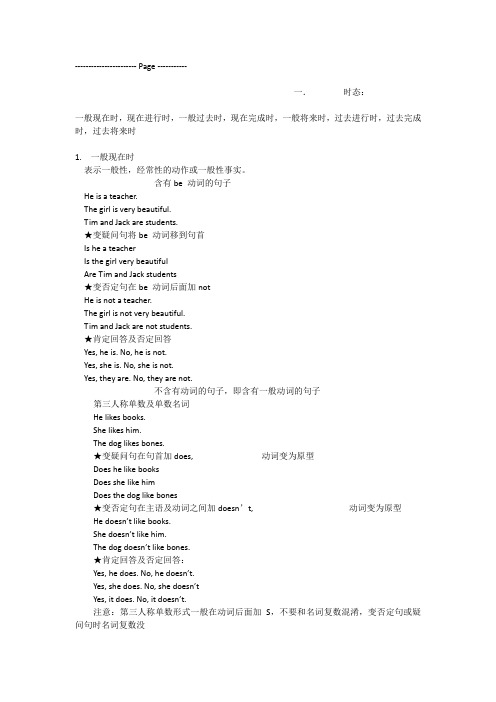
----------------------- Page -----------一.时态:一般现在时,现在进行时,一般过去时,现在完成时,一般将来时,过去进行时,过去完成时,过去将来时1. 一般现在时表示一般性,经常性的动作或一般性事实。
含有be 动词的句子He is a teacher.The girl is very beautiful.Tim and Jack are students.★变疑问句将be 动词移到句首Is he a teacherIs the girl very beautifulAre Tim and Jack students★变否定句在be 动词后面加notHe is not a teacher.The girl is not very beautiful.Tim and Jack are not students.★肯定回答及否定回答Yes, he is. No, he is not.Yes, she is. No, she is not.Yes, they are. No, they are not.不含有动词的句子,即含有一般动词的句子第三人称单数及单数名词He likes books.She likes him.The dog likes bones.★变疑问句在句首加does, 动词变为原型Does he like booksDoes she like himDoes the dog like bones★变否定句在主语及动词之间加doesn’t, 动词变为原型He doesn’t like books.She doesn’t like him.The dog doesn’t lik e bones.★肯定回答及否定回答:Yes, he does. No, he doesn’t.Yes, she does. No, she doesn’tYes, it does. No, it doesn’t.注意:第三人称单数形式一般在动词后面加S,不要和名词复数混淆,变否定句或疑问句时名词复数没有任何变化。
- 1、下载文档前请自行甄别文档内容的完整性,平台不提供额外的编辑、内容补充、找答案等附加服务。
- 2、"仅部分预览"的文档,不可在线预览部分如存在完整性等问题,可反馈申请退款(可完整预览的文档不适用该条件!)。
- 3、如文档侵犯您的权益,请联系客服反馈,我们会尽快为您处理(人工客服工作时间:9:00-18:30)。
五种时态五种时态讲解及练习题英语的时态(tense)是一种动词形式,不同的时态用以表示不同的时间与方式。
下面就英语中常见的八种基本时态进行阐述,其它的时态都是在这八种时态的基础上结合而成的。
一、一般现在时:1.概念:经常、反复发生的动作或行为及现在的某种状况。
2.时间状语:always, usually, often, sometimes, every week (day, year, month...), once a week, on Sundays,3.基本结构:动词原形(如主语为第三人称单数,动词上要加(e)S)4.否定形式:am/is/are+not;此时态的谓语动词若为行为动词,则在其前加don't,如主语为第三人称单数,则用doesn't,通常还原行为动词。
5.一般疑问句:把be动词放于句首;用助动词do提问,如主语为第三人称单数,则用does,同时,还原行为动词。
6.例句:It seldom snows here.He is always ready to help others.Action speaks louder than words.1.I like ______ (swim).2.He _________(read) English every day.3.We _________(go)to school at seven in the morning.4.Mike________(go)to school at seven in the morning.5.My mother________(like) ______(go) shopping.6.I can ________(draw) many beautiful pictures.7.She_________(make) a model plane.8.Do you ________(like)_________(run)?9.Does he_________(like)_________(jump) ?10.Does Nancy_________(grow)flowers on Saturday ?11.The teachers________(like)___________(dance).12.The teacher________(like)____________(dance).2)用所给的人称改写句子1.I take photos on Sunday. ( Mike)2.We grow beautiful flowers. (she)3.They like collecting stamps. (Ben)4.I listen to music carefully. (my aunt)5.You like making a model ship. (Helen)二、一般过去时:1.概念:过去某个时间里发生的动作或状态;过去习惯性、经常性的动作、行为。
2.时间状语:ago, yesterday, the day before yesterday, last week(year, night, month…), in 1989, just now, at the age of 5, one day, long long ago, once upon a time, etc.3.基本结构:be动词;行为动词4.否定形式:was/were+not;在行为动词前加didn't,同时还原行为动词。
5.一般疑问句:was或were放于句首;用助动词do的过去式did 提问,同时还原行为动词。
6.例句:She often came to help us in those days.I didn't know you were so busy.用be动词的适当形式填空1. I ______ an English teacher now.2. She _______ happy yesterday.3. They _______ glad to see each other last month.4. Helen and Nancy ________ good friends.5. The little dog _____ two years old this year.6. Look, there ________ lots of grapes here.7. There ________ a sign on the chair on Monday.8. Today _____ the second of June. Yesterday ______ the first of June. It _____ Children's Day. All the students ______ very excited.用所给动词的适当形式填空1. I ______ (watch) a cartoon on Saturday.2. Her father _______ (read) a newspaper last night.3. We _________ to zoo yesterday, we _____ to the park. (go)4. ______ you _______ (visit) your relatives last Spring Festival?5. ______ he _______ (fly) a kite on Sunday? Yes, he ______.6. Gao Shan _______ (pull) up carrots last National Day holiday.三、现在进行时:1.概念:表示现阶段或说话时正在进行的动作及行为。
2.时间状语:now, at this time, these days, etc.3.基本结构:am/is/are+doing4.否定形式:am/is/are+not+doing.5.一般疑问句:be动词放于句首。
6.例句:How are you feeling today?He is doing well in his lessons.用所给的动词的正确形式填空:1.The boy __________________ ( draw)a picture now.2. Listen .Some girls __________( sing)in the classroom .3. My mother ____________ ( cook )some nice food now.4. What _____ you ______ ( do ) now?5. Look . They _____________( have) an English lesson .用现在进行时完成下列句子:1.What_________you__________(do)?2.I_____________(sing) an English song.3.What________he____________(mend)?4.He______________(mend) a car. 35.______you__________(fly) a kite?Yes,_______.6.______she___________(sit) in the boat?7.______you_____________(ask) questions?8.We_______________(play) games now.四、现在完成时:1.概念:过去发生或已经完成的动作对现在造成的影响或结果,或从过去已经开始,持续到现在的动作或状态。
2.时间状语:recently, lately, since…for…,in the past few years, etc.3.基本结构:have/has + done4.否定形式:have/has + not +done.5.一般疑问句:have或has提前6.例句:I've written an article.It has been raining these days.单项选择1、Both his parents look sad .Maybe they _________what' s happened to him .A. knew B. have known C. must know D.will know2、He has _______ been to Shanghai , has he ?A. already B.never C.ever D. still3、Have you met Mr Li ______?A. just B. ago C.before D. a moment ago4、The famous writer _____ one new book in the past two yearA. is writing B.was writing C.wrote D.has written5、-Our country ______ a lot so far .-Yes . I hope it will be even ______ .A. has changed ; well B. changed ; goodC. has changed ; better D. changed ; better6、Zhao Lan ______already ______in this school for two years .A. was ; studying B. will ; study C. has ; studied D. are ; studying7、We ______ Xiao Li since she was a little girl .A. know B. had known C. have known D. knew 8、Harry Potter is a very nice film .I_______ it twice .A. will see B. have seen C. saw D.see9、-These farmers have been to the United States .-Really ? When _____ there ?A. will they go B. did they goC. do they go D. have they gone10、-______ you ___ your homework yet ?-Yes . I _____ it a moment ago .A. Did ; do ; finished B. Have ; done ; finishedC. Have ; done ; have finished D. will ; do ; finish五、一般将来时:1.概念:表示将要发生的动作或存在的状态及打算、计划或准备做某事。
